[ESP + ENG] El Libro que Cambió mi Vida y la Manera de ver Nuestra Historia Latinoamericana || The Book That Changed My Life and the Way I Look at Our Latin American History
Un Libro que ha Cambiado mi Vida.
Un Libro que ha Cambiado mi Vida.
Hola, respetable comunidad de @hivebookclub y amantes de la lectura, en ocasión de participar en este gran concurso para bibliófilos, comparto con ustedes mi experiencia con esta obra maestra de la literatura hispana. Decir que un solo libro ha cambiado nuestras vidas es algo difícil, desde mi punto de vista, haber leído un gran libro puede estar implícito en el hecho de que estábamos preparados previamente para ese momento tan especial, es decir, debes pasar a veces, por ciertas etapas que te dan el enfoque necesario, para recibir a plenitud el mensaje que una gran obra literaria trae a nuestro ser. En base a este escenario, me es más fácil identificar uno de los textos que después de leer, tuvo tal influencia que logró darme una visión distinta de las cosas, de los hechos históricos de los cuales quizás no se nos habla lo suficiente. Hechos que marcaron el porvenir nuestro continente y que después de leer esta obra, nos deja una idea más clara del cómo y por que, llegamos a nuestra realidad actual, porque es consecuencia de situaciones pasadas, situaciones ocasionadas por una carencia de proyecto de desarrollo para nosotros.
A Book That Changed My Life.
Hello, respectable community of @hivebookclub and reading lovers, on the occasion of participating in this great contest for bibliophiles, I share with you my experience with this masterpiece of Hispanic literature. To say that a single book has changed our lives is something difficult, from my point of view, having read a great book may be implicit in the fact that we were previously prepared for that special moment, that is, you must sometimes go through certain stages that give you the necessary focus, to fully receive the message that a great literary work brings to our being. Based on this stage, it is easier for me to identify one of the texts that, after reading, had such an influence that it managed to give me a different vision of things, of historical facts that perhaps we are not told enough about. Facts that marked the future of our continent and that after reading this work, it gives us a clearer idea of how and why we arrived at our current reality, because it is a consequence of past situations, situations caused by a lack of a development project for us.

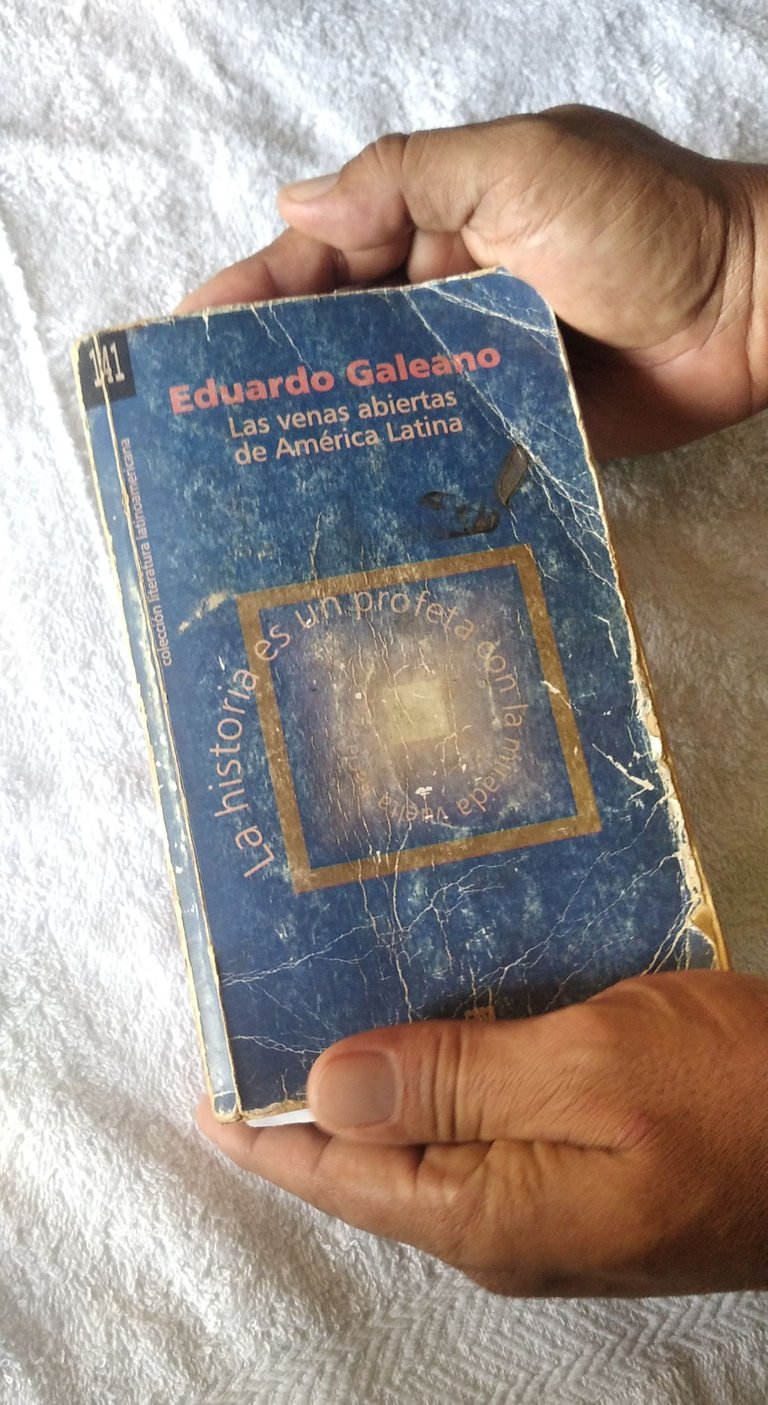

“Las Venas Abiertas de América Latina” es considerada la obra maestra del escritor uruguayo Eduardo Galeano, tuve la oportunidad de adquirirlo hace 17 años en una feria y comprarlo fue una de las mejores inversiones que hice en esos tiempos jajaja. Es una lectura bastante profunda, pero el autor le da ese toque mágico por la manera como narra los hechos, con un acertadísimo orden secuencial de cada evento y su repercusión a mediano y largo plazo. Hace especial énfasis en el tema económico de los países que conforman Latinoamérica, ubicándose en distintas épocas claves en la historia de estas naciones, que no tuvieron la oportunidad de ser anfitriones de las inversiones necesarias para enrumbarse hacia el bienestar de sus ciudadanos. Explica más bien, muy detalladamente los hechos de extracción de nuestras inmensas riquezas, esas que en verdad nos pertenecían a nosotros y de las cuales ignorábamos su valor monetario, de hecho, lo monetario no existía. Nuestra esencia indígena contaba con valores de familia, de cooperación y de hermandad, éramos entonces absolutamente libres. No obstante, luego de haber sido “descubiertos” poco queda de aquella libertad, si bien hemos evolucionado, ha sido al ritmo que las grandes potencias han dictaminado, sea cual sea el método, el resultado viene siendo el mismo. Así nacimos y es nuestra realidad, nuestros países han tenido una histórica situación de pobreza económica que es paradójico, irónico y sarcástico a la vez, siendo los países donde sobran las riquezas naturales.

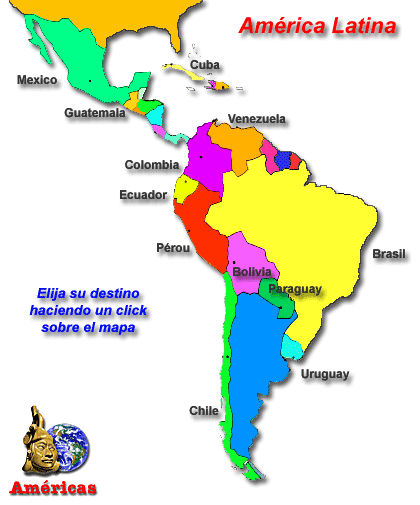 Fuente Imagen
Fuente Imagen
"The Open Veins of Latin America" is considered the masterpiece of the Uruguayan writer Eduardo Galeano, I had the opportunity to acquire it 17 years ago at a fair and buying it was one of the best investments I made in those times hahaha. It is quite a deep reading, but the author gives it that magical touch by the way he narrates the facts, with a very accurate sequential order of each event and its repercussions in the medium and long term. He places special emphasis on the economic issues of the countries that make up Latin America, placing himself in different key periods in the history of these nations, which did not have the opportunity to host the necessary investments to move towards the wellbeing of their citizens. Rather, it explains in great detail the facts of the extraction of our immense riches, those that truly belonged to us and of which we were unaware of their monetary value, in fact, the monetary did not exist. Our indigenous essence had values of family, cooperation and brotherhood, and we were absolutely free. However, after we were "discovered" there is little left of that freedom, and although we have evolved, it has been at the pace dictated by the great powers, whatever the method, the result has been the same. This is how we were born and this is our reality, our countries have had a historical situation of economic poverty, which is paradoxical, ironic and sarcastic at the same time, being the countries where natural wealth is abundant.

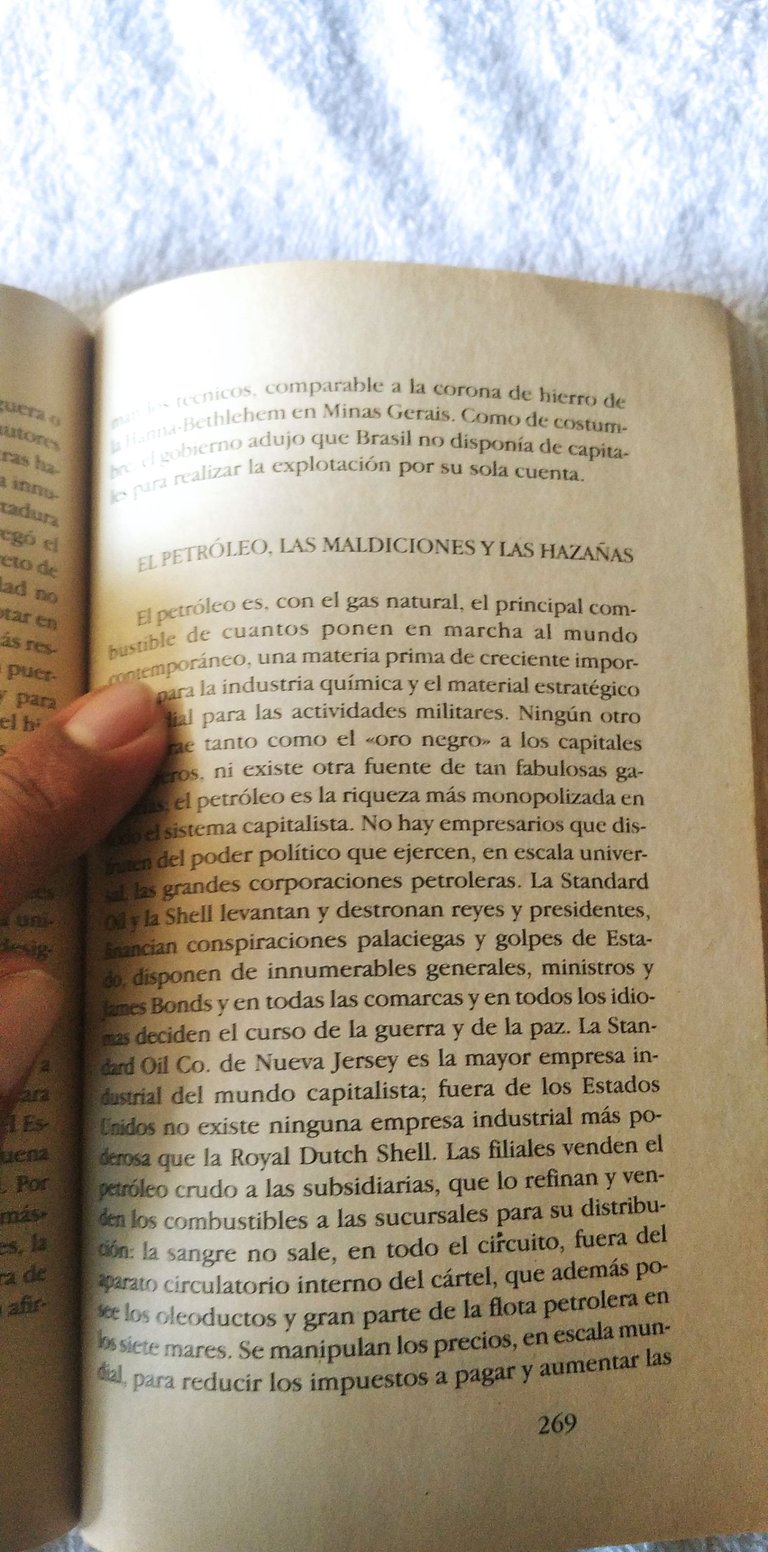

Como su título lo indica, la obra nos muestra algo que quizás ya sabíamos y es el desangramiento permanente de nuestros recursos y de nuestros productos, siempre para favorecer a naciones extranjeras, que lejos de venir a favorecernos, lo han hecho para satisfacer sus propias necesidades, en abierta referencia a los países que fungieron como colonizadores de los pueblos del sur. Es así como sacaron lo mejor de cada nación, desde productos agrícolas hasta minerales, ¿qué tanto ha cambiado eso? El autor nos hace esa intencional parábola con gran habilidad, porque en realidad hoy en día hasta el talento humano se ha visto en la necesidad de migrar a otras latitudes y termina laborando para el desarrollo de esos países de residencia, lo enfoca de tal manera, que terminamos dándole la innegable razón. Ante esa exposición de que nos lo han quitado casi todo, hasta nuestra identidad en muchos casos. Haciendo un paseo por la época del oro blanco de entonces, el cual era el azúcar en Brasil y Cuba. Las perlas y piedras preciosas de las Bahamas, las montañas de plata del Potosí, el oro en Cuzco, la Madera y el ciclo del caucho también del Brasil, es en verdad una lectura que enriquece de conocimiento, pero también nos refleja nuestras continuas e interminables desgracias, esas que no nos permiten disfrutar de ese inmenso manantial de recursos provistos por Dios y la naturaleza, ni antes ni ahora en la actualidad. Hace constante mención de la voracidad del capitalismo, las diversas formas de esclavitud, las de antes, las de ahora; del nuevo coloniaje de las corporaciones transnacionales y de las franquicias que penetran cuanto país desean sumiéndonos bajo sus reglas y estándares pero que tampoco critica al modelo comunista o socialista que de igual manera nos aqueja, lejos de brindar soluciones, empeora y hace más crítico el pozo de paredes resbalosas el cual allí mismo se menciona. Resalta esa implícita necesidad de los Estados Unidos de nuestros minerales, como los pulmones necesitan al aire, pero ni de lejos menciona la corrupción desmedida del “supuesto” modelo salvador que actualmente seduce y se esparce por el mundo. La eterna lucha entre dos conceptos de vida, que poco hacen por mejorar la de los sobrevivientes que estamos en medio de tal guerra y que nos mencionan solo en las estadísticas de las obras de teatro eleccionarias.
As its title indicates, the play shows us something that perhaps we already knew, and that is the permanent bleeding of our resources and our products, always to favour foreign nations, which far from coming to favour us, have done so to satisfy their own needs, in open reference to the countries that acted as colonisers of the peoples of the south. This is how they got the best out of each nation, from agricultural products to minerals, how much has that changed? The author makes this intentional parable with great skill, because in reality nowadays even human talent has been forced to migrate to other latitudes and ends up working for the development of those countries of residence, he focuses it in such a way that we end up giving him the undeniable reason. Faced with the exposure that almost everything has been taken away from us, even our identity in many cases. Taking a walk through the era of the white gold of the time, which was sugar in Brazil and Cuba. The pearls and precious stones of the Bahamas, the silver mountains of Potosi, the gold in Cuzco, the timber and the rubber cycle also in Brazil, it is indeed an enriching reading, but it also reflects our continuous and endless misfortunes, those that do not allow us to enjoy this immense source of resources provided by God and nature, neither before nor nowadays. It makes constant mention of the voracity of capitalism, the various forms of slavery, those of before, those of now; of the new colony of transnational corporations and franchises that penetrate every country they wish, submerging us under their rules and standards, but it does not criticise the communist or socialist model that similarly afflicts us, far from providing solutions, it worsens and makes more critical the pit of slippery walls which is mentioned there. It highlights the implicit need of the United States for our minerals, as lungs need air, but it does not even mention the unbridled corruption of the "supposed" saviour model that currently seduces and spreads throughout the world. The eternal struggle between two concepts of life, which do little to improve the lives of the survivors who are in the midst of such a war and who are mentioned only in the statistics of election plays.

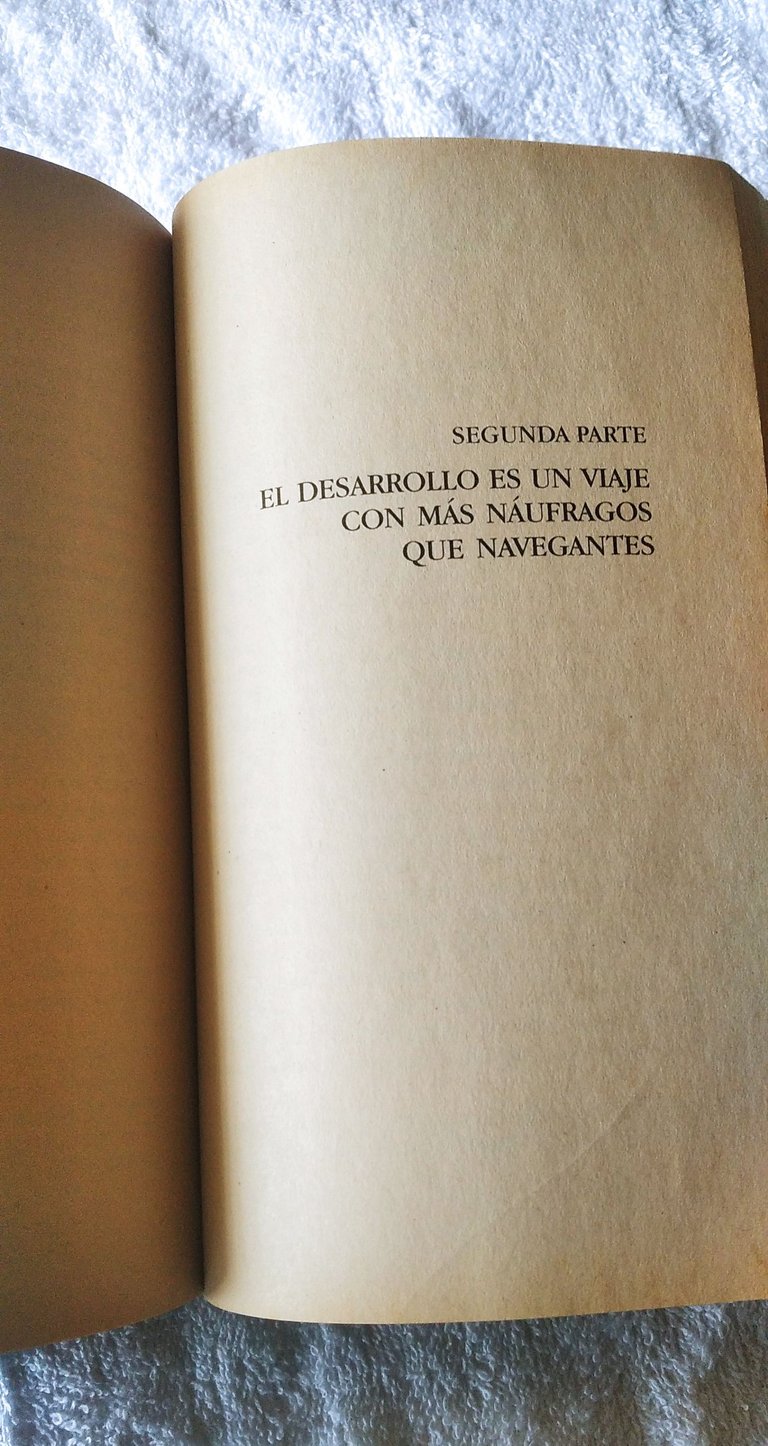

Ahora bien, debo mencionar que no todo se debe tratar de manera radical, una cosa es conocer nuestra verdadera historia, para no repetir los errores que hemos cometido anteriormente, ya sea por acción u omisión, pero tampoco debemos convertirnos en unos resentidos sociales, ya que el mundo avanza y debemos estar a la altura de las nuevas exigencias que en ese arduo camino, nos mantendrá dentro de rumbo. Las naciones avanzarán en la medida de que se eduquen, se respeten y se reconozcan las potencialidades de cada actor, seleccionando como líder, al más capaz de administrar con sabiduría, eficiencia y transparencia, los recursos de su casa, de su país.
No se trata solo de mostrar la crudeza de tu pasado, eso debe complementarse con la creación de las condiciones de legalidad, seguridad y bienestar, para los ciudadanos de nuestra amada Latinoamérica. Este libro tuvo su primera edición en el año de 1971 y hasta esa década hiso el autor sus maravillosos análisis de tantas situaciones, una como causa de otras, siempre en forma secuencial, esa lectura me atrapa, es fascinante tener otro punto de vista, otra narración que no sea la proveniente de las grandes potencias. Pero fue muy necesario escribir una segunda parte, o una continuidad de tan magistral trabajo. Porque no han sido pocos los hechos que han cambiado el curso de esa vasta historia y ha faltado mucha conciencia humana para enrumbarnos definitivamente hacia un mundo mejor.
Este libro ciertamente ha cambiado mi manera de ver las cosas, pero antes tuve que estar preparado para leerlo, comprenderlo y darle el verdadero sentido.

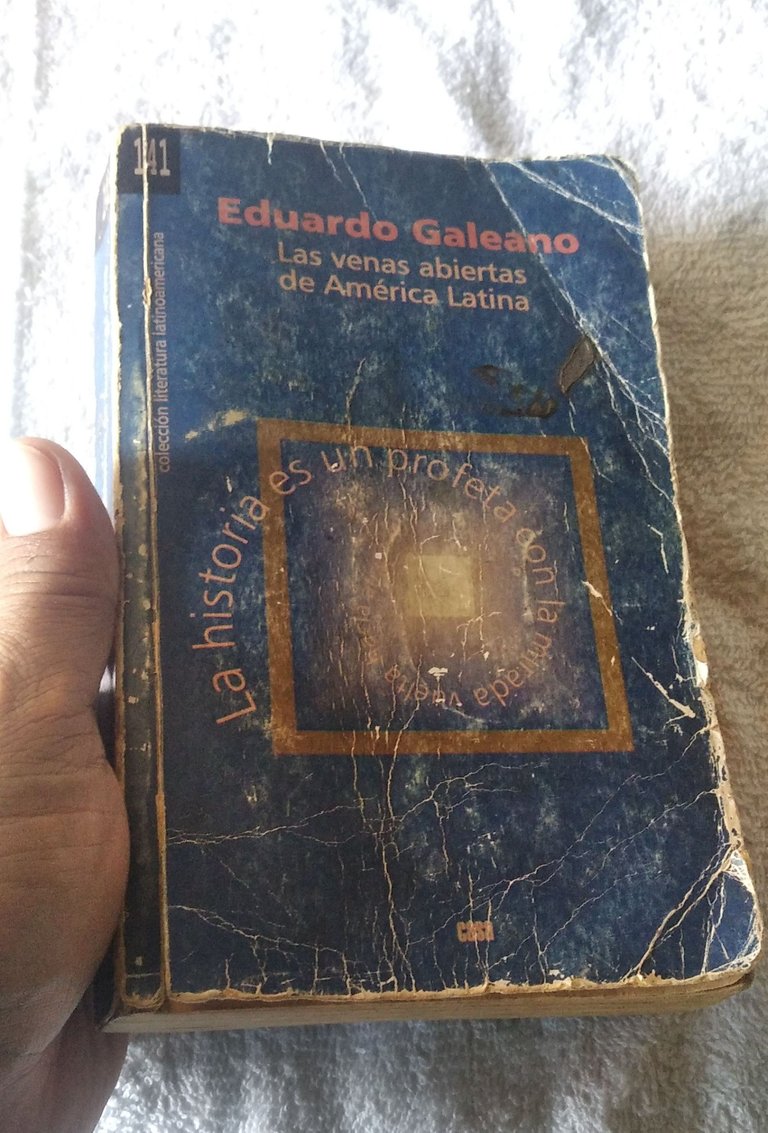


Now, I must mention that not everything should be treated in a radical way, one thing is to know our true history, so as not to repeat the mistakes we have made before, either by action or omission, but neither should we become social resentments, since the world is moving forward and we must be up to the new demands that in this arduous path, will keep us on course. Nations will advance to the extent that they educate, respect and recognise the potential of each actor, selecting as leader, the most capable of managing with wisdom, efficiency and transparency, the resources of their home, of their country.
It is not just a matter of showing the harshness of your past; this must be complemented with the creation of conditions of legality, security and well-being for the citizens of our beloved Latin America. This book had its first edition in 1971 and until that decade the author made his wonderful analysis of so many situations, one as a cause of others, always in a sequential way, that reading traps me, it is fascinating to have another point of view, another narration that is not the one coming from the great powers. But it was very necessary to write a second part, or a continuation of such a masterful work. Because there have been many events that have changed the course of this vast history and there has been a lack of human conscience to set us definitively on the road to a better world.
This book has certainly changed my way of seeing things, but first I had to be prepared to read it, understand it and give it its true meaning.

La opinión en esta publicación es de carácter personal por parte del autor.
Las Imágenes y el Libro en físico son de mi propiedad.
Texto Traducido con Deepl en su versión gratuita.
The opinion in this publication is of a personal nature on the part of the author..
The images and the physical book are my property.
Text Translated whit Deepl in its free version.


Leer esta reseña me trajo mucha nostalgia, pues mi profesora de historia solía relatarnos algunos capítulos de este libro en mi último año de bachillerato, inculcándonos lo importante que es conocer la historia de nuestras raíces.
Hola, ciertamente es una versión muy actualizada e inédita de nuestra historia latina, contada de una manera diferente pero muy acertada, adaptada a nuestra actualidad de cada país en el último siglo. Es una gran obra, pero debemos verla con mucha objetividad, escudriñando cada relato.
Me alegra que te haya gustado y traído buenos recuerdos de vida @nicxi
Gracias por leer y comentar mi publicación.
¡Saludos!
Hi ksmith7,
Visit curiehive.com or join the Curie Discord community to learn more.
Hello @curie, Thanks you for your kind valuation.
Best regards!
Excelente libro, buen anàlisis! Felicitaciones!
Saludos @cbuendia57
Gracias por su amable comentario.
Un libro de mil historias, que en ocasiones se repiten.
Excelente libro y buena reseña amigo!.
Este libro parece muy interesante, @ksmith7.
Tenía curiosidad por leerlo, pero creo que aquí en Brasil no lo encontraría tan fácilmente.
Saludos @wiseagent, en efecto, es tan interesante como parece y más allá.
Recomiendo ampliamente su lectura, incluso hay muchas una anécdotas sobre la extracción de recursos en Brasil, una de ellas de mediados del siglo XVIII, en una región denominada la Serra do Frio, donde establecieron un campamento llamado Tijuco, en la cual dice que aquel lugar lleno de minas de diamantes, "hubo una mujer mulata llamada Francisca da Silva, que logró conquistar su libertad al convertirse en la amante del millonario Joào Fernandes de Oliveira (virtual soberano de Tijuco) y ella que era fea y ya tenía dos hijos, se convirtió en la Xica que manda, y como ella nunca había visto el mar y deseaba tenerlo cerca, su caballero le construyó un gran lago artificial, en el que puso un barco con tripulación y todo..." amigo cuando leí ese capitulo en la página Nº 100 del libro, recordé claramente que esa fue una famosa telenovela transmitida en el canal Televen. Jamás había imaginado que el argumento provenía de hechos reales jajaja. Por eso Reafirmo: Este libro en verdad impactó mi vida jajaja.
Saludos y Gracias por su comentario. Espero lo consigas y agregues a tu biblioteca.